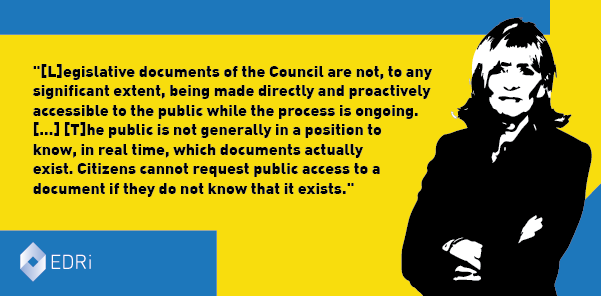European Ombudsman shares EDRi’s concerns on Council transparency
On 13 February 2018, the European Ombudsman Emily O’Reilly published a Recommendation regarding the transparency of the legislative work of the Council of the European Union. Her strategic inquiry, which involved the examination of the Council’s work around the legislative course of the General Data Protection Regulation (GDPR), among other files, showed that the Council’s general practice not to publish its legislative documents constitutes maladministration.

In March 2017, the European Ombudsman opened a strategic inquiry aiming at examining the practices of the General Secretariat of the Council in producing, circulating and publishing documents tabled in meetings of Council preparatory bodies. It was motivated by the perceived lack of opportunity for EU citizens to participate in the legislative activities of the Council. The European Ombudsman examined the answers given by the Council to its initial questions, as well as the results of its public consultation, to which EDRi responded. Furthermore, she inspected three Council files, which had been completed in 2016: the GDPR; the Directive on accessibility of websites and mobile applications of public sector bodies, and the Decision on tackling undeclared work.
The Ombudsman’s inquiry led to the conclusion that the Council is not respecting the right of EU citizens to participate in the entire EU legislative process –which includes the right to hold their elected representatives accountable–, nor the requirements of Regulation 1049/2001 of 30 May 2001 regarding public access to European Parliament, Council and Commission documents. This Regulation establishes that legislative documents –“documents drawn up or received in the course of procedures for the adoption of acts which are legally binding in or for the Member States”– must be made directly accessible to the public unless exceptions apply.
The Ombudsman’s Recommendation includes most of the comments we made in our response to the consultation. The European Ombudsman:
- Considers that “the current widespread and arbitrary practice, of marking most preparatory documents in ongoing legislative procedures as being restricted under the ill-defined designation of “LIMITE”, constitutes a disproportionate restriction on citizens’ right to the widest possible access to legislative documents”, and therefore recommends that the Council adopts “clear and publicly available criteria” for the application of the “LIMITE” status –which should only apply to those documents which, at the point of assessment, are exempt from disclosure on the basis of an exception provided for in Regulation 1049/2001;
- Notes that the Council’s General Secretariat does not systematically record the positions expressed by Member States in discussions within preparatory bodies, as some States prefer not to reveal their changing positions. However, she points out that changing positions is part of democratic decision-making, and therefore suggests that the Council “proactively and directly” discloses the documents containing the positions of the Member States, in a timely manner; and
- Finds that legislative documents are not being made “directly and proactively accessible to the public” by the Council, and that there are inconsistencies regarding the extent to which the work of the preparatory bodies is recorded, as well as documentation gaps. In light of the incompleteness of the Council’s public register of documents, the Ombudsman recommends making it user-friendly, by listing all types of documents chronologically –following the example of European Parliament’s Legislative Observatory–, as well as adopting guidelines concerning the types of documents that preparatory bodies produce in the context of legislative procedures and the information to be included in those documents.
European Ombudsman’s suggestions give concrete and substantive indications to the Council on how to facilitate the exercise of the right of EU citizens to actively participate in the EU legislative process. Currently, citizens depend on leaks, published for example on Statewatch.org, their perseverance to access public documents via access to documents requests, or the recently launched fast-track complaint procedure of the European Ombudsman. If the Ombudsman’s recommendations are followed, we would also have fewer headlines from certain media outlets about “leaks” that are only available to their paying customers.
European Ombudsman’s Recommendation (13.02.2018)
https://www.ombudsman.europa.eu/cases/recommendation.faces/en/89518/html.bookmark
EDRi’s response to the Ombudsman’s consultation (12.12.2017)
https://edri.org/files/consultations/euombudsman_counciltransparency_20171212.pdf
Regulation 1049/2001 regarding public access to European Parliament, Council and Commission documents (30.05.2001)
http://eur-lex.europa.eu/legal-content/EN/TXT/?uri=LEGISSUM%3Al14546
(Contribution by Ana Ollo, EDRi intern)


